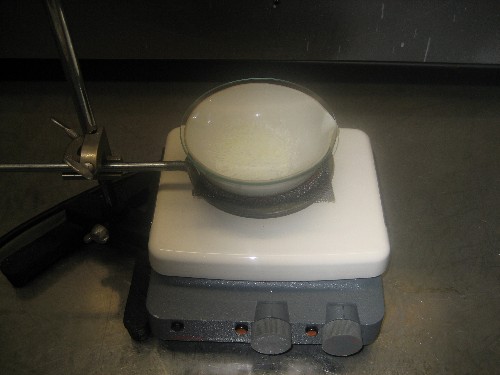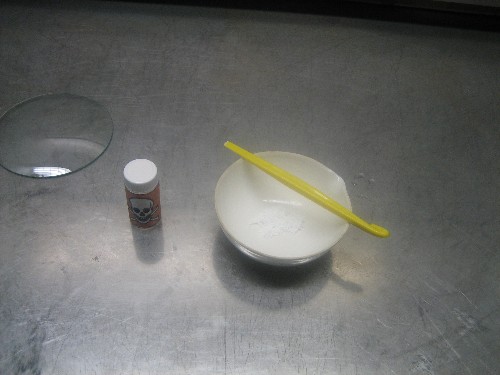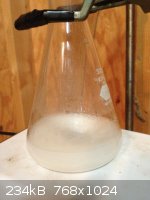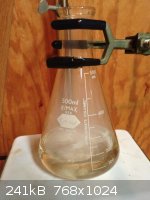| Pages:
1
2 |
Magpie
lab constructor
    
Posts: 5939
Registered: 1-11-2003
Location: USA
Member Is Offline
Mood: Chemistry: the subtle science.
|
|
mercury(II) chloride
<div align="center"><img src="../scipics/_warn.png" /> <em>Mercury and it's compounds are <a
href="http://en.wikipedia.org/wiki/Mercury_poisoning" target="_blank">cumulative neurotoxins</a> <img src="../scipics/_wiki.png" /> and
<a href="http://en.wikipedia.org/wiki/Mercury_cycle" target="_blank">persistent environmental pollutants</a> <img
src="../scipics/_wiki.png" />! Proceed at your own risk & <u>dispose of wastes responsibly</u>.</em> <img
src="../scipics/_warn.png" /></div><br /><hr width="80%" />
I needed about 2g of HgCl2 so decided to make it from the small amount (~3g) of Hg I reclaimed from the switch of an old thermostat. I looked over
the forum pretty thoroughly before deciding to use the Mr Anonymous prep presented by Polverone in another thread. What I liked about this prep is
that I could do it all in one vessel (basically) with no filtration.
The Hg was dissolved in a 50 ml Erlenmeyer flask at room temperature in con HNO3 in my hood per procedure. The clear faintly green solution of
Hg(NO3)2 was then placed in a small (~4") evaporating dish.
The evaporating dish was placed on a 600 ml beaker containing about 250 mL H2O as water bath heater. Per procedure the water was just barely boiling.
This very slowly dried the deliquescent mercuric nitrate hydrate to a mushy white solid. In fact, it never really dried even after several hours,
and IMO wasn't going to dry due to inadequate heat plus the swirling water vapor from the bath. Therefore the dish was removed from the bath and
placed on a gauze supported by a ring about 3/4" above the hot plate set at medium heat (see picture below). Here the hydrate fairly quickly turned
into HgO with a delicate yellow color. This powder shows no signs of deliquescence. Tommorrow this will be converted to HgCl2.

<!-- bfesser_edit_tag -->[<a href="u2u.php?action=send&username=bfesser">bfesser</a>: added
warning]
[Edited on 14.10.13 by bfesser]
The single most important condition for a successful synthesis is good mixing - Nicodem
|
|
|
Magpie
lab constructor
    
Posts: 5939
Registered: 1-11-2003
Location: USA
Member Is Offline
Mood: Chemistry: the subtle science.
|
|
HgCl2
Although this may not be the best thread I will report my preparation of HgCl2 to maintain continuity with my previous post. If a mod wishes to move
one or both posts it is OK with me.
To the HgO prepared yesterday I added the 20% excess of con HCl per the procedure of Mr Anonymous. This was then placed on the 600ml beaker water
bath used before. Here I was very careful to just keep the water at barely an occaisional boil bubble to minimize heat and sublimation. The liquid
turned yellow and steadily evaporated away up my fume hood exhaust. The solid tended to form on the evaporating dish wall just above the liquid.
This was finished after 1/2hr or so.
The fume hood was vital for this step I think. Although the vapors were mostly H2O and HCl I'm sure some HgCl2 traces were present. The middle of
the upper leading edge of the lower baffle of my hood, which is bare aluminum, now has a discernable metallic mercury look to it. Not much there, but
noticeable. It may have been a better idea to do this outside.
The pure white HgCl2 was easily scraped off the bottom of the dish and placed in a tared bottle. The net weight indicated a yield of 100% which is a
good sign.
Would I do this again? Probably not. Seems too risky.
Although the product is hard to see as it is so white, here's a picture:

The single most important condition for a successful synthesis is good mixing - Nicodem
|
|
|
polymerizer87
Harmless

Posts: 35
Registered: 16-7-2012
Member Is Offline
Mood: No Mood
|
|
HgCl2 Synthesis (mercury (ii) chloride)
Feel free to merge this thread, I'm not sure if this has been posted before. Here is a run through on the synthesis of Mercury (ii) Chloride I've done
recently.
Ill start with the HgSO4 formation:
Hg + 2 H2SO4 → Hg(SO4) + SO2 + 2 H2O
A conical flask (Erlenmeyer) equipped with a magnetic stirbar was charged with 39.56 g of Hg and ~120 mL of H2SO4 ( I used a beaker you all know how
accurate these things are). Gradually heat was applied and magnetic stirring was started. Initially the solution appeared clear with beads of Hg at
the bottom of the flask. A thermometer was not used in the initial reaction, once white vapors appeared the heat was turned down to minimize acid
loss. The entire reaction was stirred for 18 hours to ensure all Hg had converted to HgSO4.
Here are some pictures of the process (ill post the 2nd half here soon...)
 
|
|
|
polymerizer87
Harmless

Posts: 35
Registered: 16-7-2012
Member Is Offline
Mood: No Mood
|
|
Picture 1: In process HgSO4 formation (t=3 hours)
Picture 2: In process HgSO4 formation (t=30 minutes)
|
|
|
jamit
Hazard to Others
  
Posts: 375
Registered: 18-6-2010
Location: Midwest USA
Member Is Offline
Mood: No Mood
|
|
Did you use concentrated sulfuric acid (98%) or a weaker sulfuric acid like battery acid?
So how long did it take for you to dissolve the mercury?
I would like to hear and see more of your results if you can make that available.
I've wondered about mercuric compounds but was hesitant in doing what you're doing
because of the toxic nature of the substance.
thanks for sharing.
|
|
|
liquidlightning
Hazard to Self
 
Posts: 66
Registered: 10-5-2012
Location: Washington
Member Is Offline
Mood: Witty
|
|
Probably concentrated as he had white vapors. Doesn't happen with dilute.
|
|
|
peach
Bon Vivant
    
Posts: 1428
Registered: 14-11-2008
Member Is Offline
Mood: No Mood
|
|
You can start with dilute sulphuric and turn the heat up, but you'll have to wait a while for all the extra water to boil off (the sulphuric to start
concentrating). It'll end up at a few hundred degrees Celsius.
Be careful playing with mercury salts inside in open vessels, the chloride and nitrate (for instance) will both sublimate at rather low temperatures
and be evaporating into the air prior to this. If you're breathing the vapour in, they'll dissolve fine through the lining of your lungs, straight
into your bloodstream and on to your brain where each of those mercury ions will jam a neuronal growth cone (which are used to create new memory
associations).
[Edited on 27-7-2012 by peach]
|
|
|
polymerizer87
Harmless

Posts: 35
Registered: 16-7-2012
Member Is Offline
Mood: No Mood
|
|
Quote: Originally posted by jamit  | Did you use concentrated sulfuric acid (98%) or a weaker sulfuric acid like battery acid?
So how long did it take for you to dissolve the mercury?
I would like to hear and see more of your results if you can make that available.
I've wondered about mercuric compounds but was hesitant in doing what you're doing
because of the toxic nature of the substance.
thanks for sharing. |
I used conc. H2SO4 (Fischer), Elemental Hg (Sigma Aldrich)
at ~14 hours into the reaction I looked under the flask and saw a rather large bead of Hg, So I turned up the heat and hit it pretty hard for about an
hour. After turning the heat down I let it sit for another 2 hours and came back with no residual Hg left in the flask!
The excess H2SO4/H2O was decanted off the HgSO4, and a previously prepared 1 L dH2O HOT was poured into the Erlenmeyer flask until
the HgSO4 turned bright yellow/orange (I agree with the commentary on Erowid that the addition of hot dH2O may be decomposing the HgSO4, I'm
considering taking this out) The HgSO4/dH2O/residual H2SO4 solution was then filtered through a buchner funnel with a 2.5 micron filter. The bright
yellow/orange filter cake was then transferred back to the flask and washed with a previously prepared 1 L saturated NaHCO3 (~80 g/1 L) solution. The
yellow/orange precipitate turned dark maroon/brown after the addition (like Zygot mentioned). The NaHCO3 solution was then decanted off and another
portion of the NaHCO3 solution was charged, and decanted again following with 3 x 100 mL dH2O washings using the same methods. At this point what is
left in the flask is a fine dark brown/maroon powder at the bottom. A magnetic stirbar and ~50 mL of dH20 is charged into the flask. Drops of HCl via
pipette is added to the suspension until brown/maroon precipitate turns yellow --> white "curds" and the addition was seized. Heat was then applied
to the solution until all H20 is evaporated. Filter--> wash---> recrystallize using boiling dH2O.
I'm currently going through another run with 80 g Hg, I'm modifying the procedure some and will be able to post some better pictures. I tried to
follow the procedure on Erowid.com for the preparation of Mercury Salts, but found that it was much easier to use a decanting method during the Hot
dH20 and sodium bicarbonate addition. It would have been extremely messy to pour the HgSO4 into boiling hot water, filter, then add saturated Sodium
bicarbonate and doing subsequent filtering and water washes. Since NaHCO3 is water soluble and HgSO4 or HgCl2 are not (at room temp)
several washings with dH2O will get all the residual NaHCO3 out. I was not worried about yield loss as I have 1 kg of elemental mercury.
Quote: Originally posted by peach  |
Be careful playing with mercury salts inside in open vessels, the chloride and nitrate (for instance) will both sublimate at rather low temperatures
and be evaporating into the air prior to this. If you're breathing the vapour in, they'll dissolve fine through the lining of your lungs, straight
into your bloodstream and on to your brain where each of those mercury ions will jam a neuronal growth cone (which are used to create new memory
associations).
[Edited on 27-7-2012 by peach] |
I agree, take extreme caution when handling mercury salts, wear gloves, maybe even wear a respirator, make sure you boil the solution following the
HCl addition outside or under a fume hood. My advice is use your noggin and wear the proper PPE. Its not that bad...
|
|
|
peach
Bon Vivant
    
Posts: 1428
Registered: 14-11-2008
Member Is Offline
Mood: No Mood
|
|
| Quote: | | Since NaHCO3 is water soluble and HgSO4 or HgCl2 are not (at room temp) several washings with dH2O will get all the residual NaHCO3
out. I was not worried about yield loss as I have 1 kg of elemental mercury. |
Careful there with the chloride, solubilities at 20C in 100ml water:
NaHCO3 9.6g
HgCl2 7.4g
NaCl 35g
This why salts of mercury, such as the chloride, are so toxic; they can enter your (aqueous) body by being soluble in water, carrying the mercury ions
with them, whereas mercury it's self isn't water soluble and won't directly react with the hydrochloric in your stomach.
|
|
|
polymerizer87
Harmless

Posts: 35
Registered: 16-7-2012
Member Is Offline
Mood: No Mood
|
|
Im really getting the mothering vibe from you peach. 
|
|
|
MR AZIDE
Hazard to Self
 
Posts: 64
Registered: 21-5-2012
Location: UNITED KINGDOM
Member Is Offline
Mood: Fizzing
|
|
Looking forward to see how this syntheses turns out, poly.........!!
Are you requiring the Mercury(ii) chloride, so that you can synthesise other Hg(II) compounds, or is it for the challenge of synthesis of the
HgCl2?.......
I personally am fascinated by Hg, its so unlike other materials to be found, and some of its compounds are superb colours.
1) Adding hydroxide to mercury(II) results in the precipitation of mercury(I) oxide, when cold the precip is a brilliant yellow, which Ive found seems
to cling and stain glassware readily. (its also slightly soluble in water giving a very weak alkali.
If its produced in hot/ boiling solutions, the precip is orange I think, due to larger particle size, this form is less reactive than yellow HgO. (
similar to Lead(II) oxides, litharge and massicot.)
2) Mercuric iodide, is a fantastic scarlet/ salmon colour, the original addition of the Iodide ions, gives a yellow precip, , but turns scarlet
almost immediately.
If the scarlet form is dried and heated as a powder, if rapidly turns yellow, and stays yellow, when cold. An amazing change happens back over into
the scarlet form ,if you gently prod the yellow, with a glass rod etc......
3) adding Al foil to HgCl2 soln, amalgamates the Al, in a strange, shimmering, quivering layer on the Al foil. It gives the illusion of the Al foil
melting, and forming dense drops in the bottom of the vessel. The Hg is easily recovered by adding the amalgam to conc, HCL or NaOH, dissolving the Al
out of the amalgam.
|
|
|
meaniac
Harmless

Posts: 8
Registered: 30-3-2012
Member Is Offline
Mood: No Mood
|
|
Out of curiosity, could battery acid be used with the addition of Hydrogen Peroxide? I have a couple of kilos of Hg myself and this thread has got me
thinking.
No conc sulfuric unfortunately.
|
|
|
S.C. Wack
bibliomaster
    
Posts: 2419
Registered: 7-5-2004
Location: Cornworld, Central USA
Member Is Offline
Mood: Enhanced
|
|
That method should never have been read much less followed. This will continue over and over...
|
|
|
polymerizer87
Harmless

Posts: 35
Registered: 16-7-2012
Member Is Offline
Mood: No Mood
|
|
what method do you suggest?
|
|
|
S.C. Wack
bibliomaster
    
Posts: 2419
Registered: 7-5-2004
Location: Cornworld, Central USA
Member Is Offline
Mood: Enhanced
|
|
A method that doesn't poison you, others, things, etc.
You've already noted water is a bad idea. It's insoluble in water because it forms the basic sulfate. This and mercurous sulfate can be fixed with
more hot conc. sulfuric acid or oxidizers. It's already been said that lovely HgO is formed with mercuric salts and aq. NaOH. There's nothing more to
add, really.
IIRC mercuric sulfate wet with conc. acid dissolves nicely in the minimum amount of brine, the basic and mercurous sulfates not so much. This is a
convenient way to add the sulfate to a large excess of dil. NaOH, but there is probably some concern with the end concentration of chloride in NaOH,
as HgO is also saline soluble to some extent; I assume also to some not-unreasonable extent in NaOH, NaOH containing chloride and sulfate and so on.
The filtrate can be treated by whatever method is desired, but in my hands (Zn/HCl, HCHO) next to nothing has remained.
|
|
|
turd
National Hazard
   
Posts: 800
Registered: 5-3-2006
Member Is Offline
Mood: No Mood
|
|
Quote: Originally posted by polymerizer87  | | The excess H2SO4/H2O was decanted off the HgSO4, and a previously prepared 1 L dH2O HOT was poured into the Erlenmeyer flask until
the HgSO4 turned bright yellow/orange (I agree with the commentary on Erowid that the addition of hot dH2O may be decomposing the HgSO4, I'm
considering taking this out) The HgSO4/dH2O/residual H2SO4 solution was then filtered through a buchner funnel with a 2.5 micron filter. The bright
yellow/orange filter cake was then transferred back to the flask and washed with a previously prepared 1 L saturated NaHCO3 (~80 g/1 L) solution.
|
Gosh. It is quite foolish to work with mercury compounds (even if it's only inorganic salts) without having invested any time in learning their
chemistry. And to outdo your own laziness you haven't even bothered to search this site.
Yes, Hg(II)SO4 forms a basic sulfate with water. It's a trivial acid-base equilibrium thing: acidify by dropwise addition of H2SO4 and practically all
will go in solution with some patience. This is elementary high school chemistry, if you don't even understand that, store your flasks in a
safe place and start reading. The first comment on the Erowid site is silly - You're supposed to use the filtrate not the filter cake! The method is
wasteful, but it is not messy (if you have some feeling about Hg chemistry). Just reuse the precipitate by dissolving it in dil. H2SO4. The second
commenter doesn't seem to know much about chemistry either. 
Jeez!
|
|
|
polymerizer87
Harmless

Posts: 35
Registered: 16-7-2012
Member Is Offline
Mood: No Mood
|
|
I've received a couple U2Us regarding this method, and all have been duly noted. However your the only one with a condescending attitude.
On a side note another method has been implemented, my 30% yield is in agreement to your claims in this being a wasteful method.
<!-- bfesser_edit_tag -->[<a href="u2u.php?action=send&username=bfesser">bfesser</a>: removed
broken unnecessary quote(s)]
[Edited on 11.10.13 by bfesser]
|
|
|
Saganism
Harmless

Posts: 18
Registered: 25-9-2012
Location: Ozark mountains
Member Is Offline
Mood: No Mood
|
|
What concentration of nitric acid is used? 68% or reagant grade?
Or does it matter?
[Edited on 5-10-2012 by Saganism]
Also, any possibility it could even be dried with any sort of agent if I wasn't able to obtain a high enough conc.?
<!-- bfesser_edit_tag -->[<a href="u2u.php?action=send&username=bfesser">bfesser</a>: merged
sequential posts]
[Edited on 14.10.13 by bfesser]
Just trying to figure some stuff out you know?
Aren't we all?
|
|
|
SixTough
Harmless

Posts: 6
Registered: 4-11-2012
Member Is Offline
Mood: No Mood
|
|
I remember doing something very similar. It is actually a pretty sweet way of making SO2 while you're at it 
|
|
|
loosejohnny
Harmless

Posts: 1
Registered: 11-10-2013
Member Is Offline
Mood: No Mood
|
|
Nice Idea
I have been very interested in MonoAtomic Elements, How can you remove the (SO4) from HG(SO4) to leave HG in Mono State?
I am working on figuring out the binding energy to remove the (SO4) to another element to leave HG in a MonoAtomic state
|
|
|
bfesser
Resident Wikipedian
    
Posts: 2114
Registered: 29-1-2008
Member Is Offline
Mood: No Mood
|
|
It's Hg, not "HG". You shouldn't even consider handling mercury, let alone it's compounds, if you don't know that. Also,
HgSO<sub>4</sub> doesn't require parenthesis around the sulfate. Finally, if you're a subscriber to that New Age bullshit about the
'healing powers of crystals' and monoatomic elements, just go away—<em>this is a science forum!</em>
|
|
|
Wizzard
Hazard to Others
  
Posts: 337
Registered: 22-3-2010
Member Is Offline
Mood: No Mood
|
|
@Bfesser - If he wants to practice his New Age medicine with mercury salts, let him do so and drive natural selection 
Truth be told, some of my customers are New Age-y people buying my pretty Alum crystals, among other things. I don't mind them so much!
@loosejohnny - It'd be far easier to just purchase Mercury as a metal, than attempt to isolate it from ANY of it's salts. What exactly are you trying
to accomplish?
|
|
|
Pyro
International Hazard
    
Posts: 1305
Registered: 6-4-2012
Location: Gent, Belgium
Member Is Offline
Mood: No Mood
|
|
loosejohnny, just dissolve it in water and add any metal lower on the scale (I forget the exact name and cant find it, can anyone help a young fool
 ) such as: Mg, Al, Zn, Fe, Pb, Cu or Ag. ) such as: Mg, Al, Zn, Fe, Pb, Cu or Ag.
so chuck in a few nails or pennies.
of course you will respect all safety features which you will look up before attempting this...
all above information is intellectual property of Pyro.  |
|
|
bfesser
Resident Wikipedian
    
Posts: 2114
Registered: 29-1-2008
Member Is Offline
Mood: No Mood
|
|
Quote: Originally posted by Wizzard  | | It'd be far easier to just purchase Mercury as a metal, than attempt to isolate it from ANY of it's salts. |
HgS is often easier to obtain (and likely cheaper) than Hg. Isolation of the element from it's sulfide is
facile—<em>yet hazardous!</em>
<strong><a href="viewthread.php?tid=18162">Refining mercury from cinnabar</a></strong>
[Edited on 14.10.13 by bfesser]
|
|
|
bfesser
|
Thread Moved
11-10-2013 at 08:30 |
macckone
International Hazard
    
Posts: 2159
Registered: 1-3-2013
Location: Over a mile high
Member Is Offline
Mood: Electrical
|
|
Dissolving in nitric <del>as in this alternate thread</del> is the commercial method of choice. Nitric dissolves mercury much more
rapidly. Other compounds are easily made from the resulting nitrates. Not to say that other methods aren't viable, but some are easier than others.
<!-- bfesser_edit_tag -->[<a href="u2u.php?action=send&username=bfesser">bfesser</a>: merged
topics; removed quote of pruned post; del]
[Edited on 14.10.13 by bfesser]
|
|
|
bfesser
|
Threads Merged
14-10-2013 at 08:41 |
bfesser
|
Thread Pruned
14-10-2013 at 08:45 |
| Pages:
1
2 |